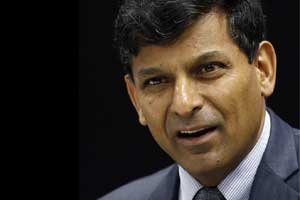As an otherwise resilient Indian rupee tumbled past the 66/$ mark to a fresh two-year low and the 30-share Sensex fell more than 1000 points, the Reserve Bank of India Governor Raghuram Rajan assured investors that the central bank will intervene with its forex reserves to curb volatility.
“We have about $355 billion in reserves plus another $25 billion as forward contracts, so in sum we have $380 billion. We will have no hesitation in using reserves,” said Rajan while speaking at the FICCI-IBA hosted banking event. “We try and prevent undue volatility and I want to repeat that again that if we see undue volatility, we have the resources to deal with that,” he added.
The Indian rupee plunged to a fresh two-year low of 66.50/$ after the 30-share Sensex tumbled more than 1000 points on the back of a meltdown in Chinese stock markets. The rupee, which had been resilient so far, has lost more than 2% over one week after China moved to devalue the Yuan by a massive 3% earlier this month. Most market participants fear that the rupee could weaken further, if the momentum continues.
The RBI, however, is looking to calm investors with Rajan saying that India is in a far better position to weather the volatility given the strength in macroeconomic fundamentals. Listing out the buffer of forex reserves, the improving growth parameters and reducing inflation, Rajan said that foreign investors are still interested in putting their money in India.
“All I can say is that in India we have to absorb this volatility. But be fairly assured that as far as fundamentals go, we are good. After a certain amount of volatility, markets will assess these fundamentals. The turmoil will settle down,” Rajan said.
Rajan also said that instead of focusing on the rupee’s fall against the dollar, the currency’s real effective exchange rate has to be looked. The rupee is overvalued by around 12% according a 36-currency basket of currencies tracked by the RBI. “What we said again and again is that we don’t try and pick the value of the rupee, it floats between these multiple forces,” he said.
Listed out positive factors that give India an edge over other emerging market economies, Rajan said that the measures of both the government and the RBI has borne fruit in bringing inflation down. Nevertheless, he cautioned that the economic growth is still below potential and inflation expectations are still high despite headline retail inflation having fallen sharply. Also, high stressed assets on the books of banks continue to crimp their ability to pass on policy rate cuts, he added.
